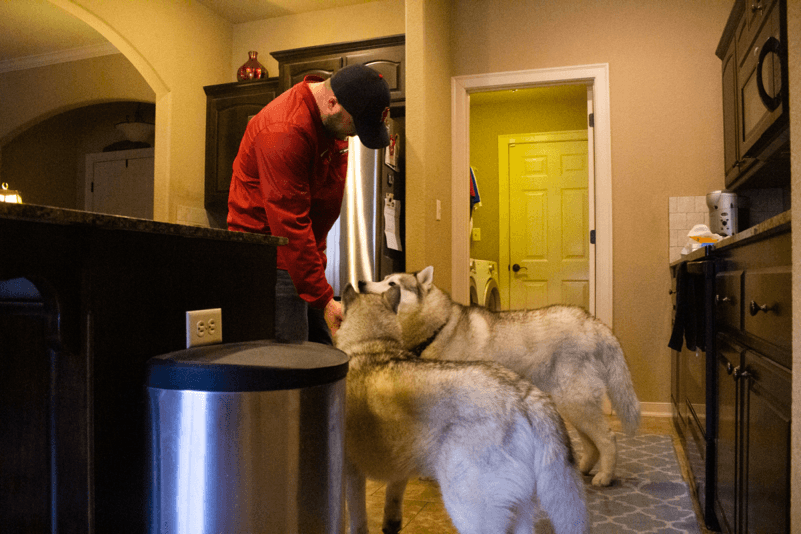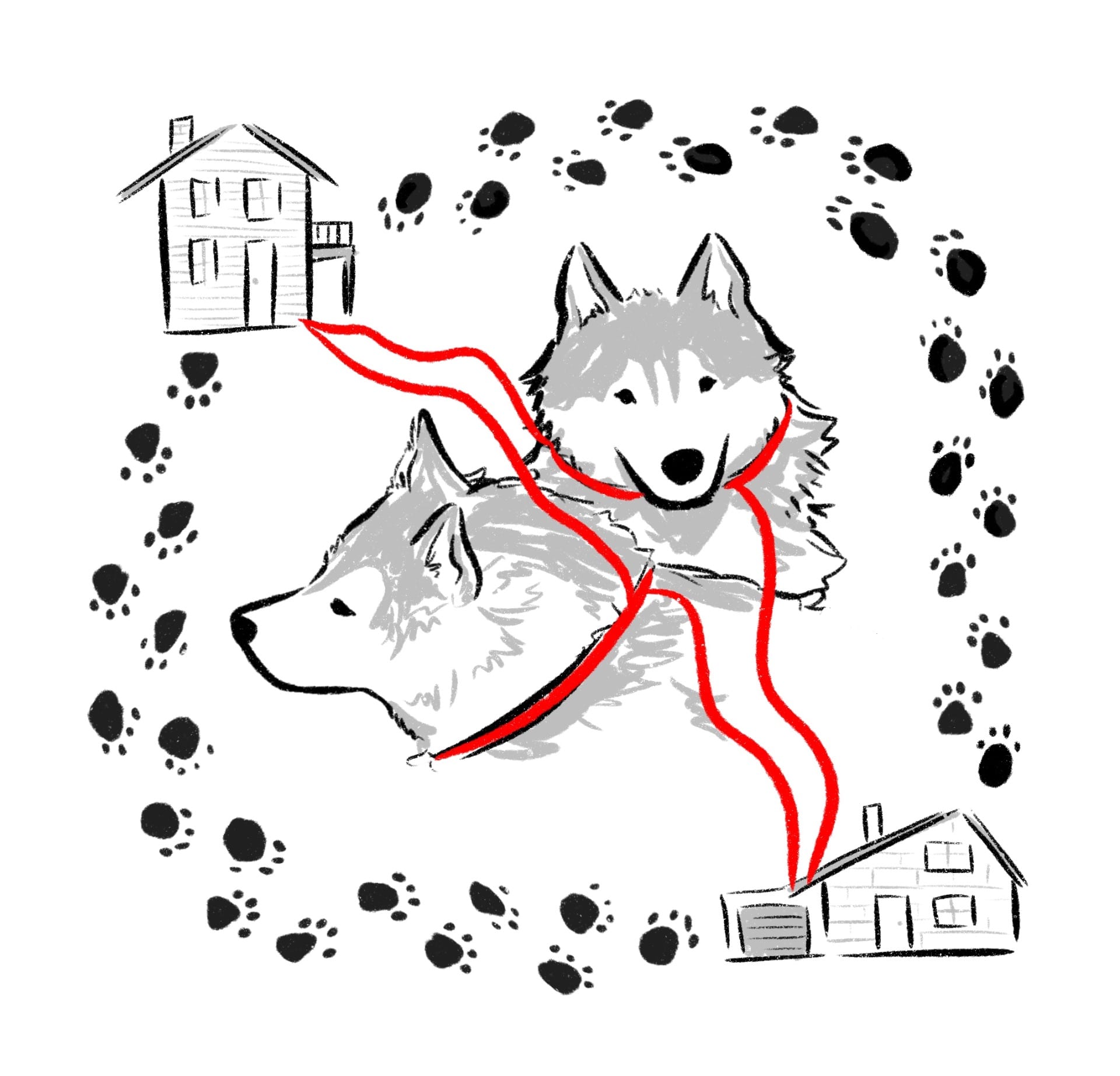Who gets the dog after the relationship ends?
By Jake Halbert
March 29, 2019
Katelyn Gallant pulls into a familiar driveway after a long day of work. Normally, she would be at her own home at this time, but today is Wednesday. This means that it’s her turn to receive custody of her children … sort of.
Katelyn’s “children” are Ghost and Eko, two Siberian huskies that she adopted while still married to her ex-husband, Greg Gallant. Both Fayetteville residents loved their dogs dearly, and neither of them wanted to part ways with the pups as the relationship neared its end.

After playing at a nearby dog park, Greg says goodbye to his dogs as he prepares to leave home March 8. Photo by Jake Halbert
It’s not uncommon for people to get a dog during a relationship – sometimes as a precursor to having children. For some couples, dogs are just as beloved as children.
However, couples sometimes fail to compromise on the terms of ownership for their pets once the relationship ends. Nearly 85 million families, or 68 percent of U.S. households, own a pet, according to the 2017-2018 National Pet Owners Survey conducted by the American Pet Products Association. This is up 56 percent from 1988 when the last survey was conducted, meaning that the likelihood of custody disputes becoming more common is high.
“If no children are involved, the primary caretaker of the animal usually takes ownership, but sometimes the party with greater emotional attachment takes the animal instead,” said Brandon Pickett, attorney and former head of client services for Bowman and Lewis PLLC in Little Rock.
The issue of “doggie custody” is something new that leaves many lawmakers scratching their heads to define, Pickett said. In California, legislation was enacted as of January 1, 2019, to consider pets in the same way as children during divorce. This means that custody and partial custody is granted at the discretion of judges after weighing factors such as income, partiality of pets to a preferred owner, leisure time to focus on the animal or even geographical conditions, like the accessibility of parks.
In Arkansas, when someone buys an animal while in a relationship and both parties put forth resources to obtain it, the law considers it joint property, Pickett said. Joint property is split up during divorce between both parties and their lawyers. This is usually where most conflicts arise.
When the Gallants split, Ghost and Eko were considered, by Arkansas law, in the same way as a lamp or a fridge. Most couples aren’t willing to share their appliances, but technically, it can be done. Greg said that he and Katelyn had to sell the dogs and split the money or reach a compromise that would satisfy both parties.
“It is what it is,” said Katelyn. “I love these dogs, and I wouldn’t change anything about them. It isn’t ideal, but we make it work.”

Illustration by Raleigh Anderson
If no agreement is made on who gets what – or in this case, who gets the animals and when – the matter goes to court for a judge’s decision. The Gallants knew they couldn’t let a judge separate the dogs, so they agreed that Greg had the most flexible schedule and could care for the animals a majority of the time. For this reason, Katelyn gets the dogs every other Wednesday and Saturday.
“Ghost gets really bad anxiety when he’s away from Eko for too long,” Greg said. “We couldn’t do that to them. They’re pack animals.”
Most dog owners would agree that raising a dog is like raising a child, especially when adopted as a puppy. They have to be fed, exercised, cleaned up after and trained every day. Many dogs live to be 10-14 years old, which is a large investment of time and resources. All the while, the animal is gradually forming a tight emotional connection to their human companions.
“Having the dogs as an element in the relationship kept us together longer than we probably would have stayed if they weren’t there,” Katelyn said. “The emotional toll of a failing relationship is something they can definitely see happening.”
University of Arkansas alumna Sarah Williams adopted her dog Mayer while she was in a relationship with another student, Sam Stewart. Stewart did not respond to multiple requests for comment.
While they were dating, Williams paid for the dog herself, she said. This legally warrants complete ownership. But she still recognizes that Stewart and Mayer established a familial bond early in her dog’s life.
“It wouldn’t feel right to just ignore that,” Williams said. “Sam was there when Mayer was being raised, so he is, in many ways, a father figure to him.”
Whenever Williams and Mayer are in town, they drop by Stewart’s house to play. The joy she sees in her dog as he is interacting with Stewart is enough to justify the continued interaction, Williams said.
Aubrey Tucker, a senior at the University of Arkansas, decided at the bitter end of her relationship that her dog, Clark, was better off with her and took him home without consulting her ex. She says that Clark never would have received the care that puppies require if she didn’t act.
Tucker vividly remembers driving with her mom to the home she and her ex once shared for the last time. They pulled up to the curb in a hurry, opened the door and called the dog across the front yard. Once he jumped into the vehicle, they were gone just as fast as they came.
“That was the official end.” Tucker said. “Clark is mine now, and he’s healthier and happier for it.”